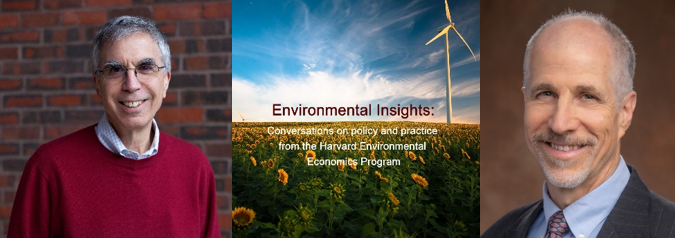I have recently hosted several guests in my podcast series, “Environmental Insights: Discussions on Policy and Practice from the Harvard Environmental Economics Program,” with great expertise on the electricity sector. And today, I’m continuing that with the most recent episode of the podcast. This is appropriate because the electricity sector – in many countries – is both a major source of carbon dioxide (CO2) emissions, and is also a very important potential part of the “solution space,” due to the promise of increased electrification of the transportation and building sectors (accompanied by greater reliance on renewable sources of generation).
In the most recent episode, I engage in conversation with an economist who has spent close to four decades studying the electricity sector, making important contributions to the design of public policies, and one who also has great expertise in the broader realm of regulatory economics and industrial organization. I’m referring to Severin Borenstein, who is Professor of the Graduate School at the Haas School of Business at the University of California, Berkeley, where he is the long-time Director of its highly-regarded Energy Institute. The podcast is produced by the Harvard Environmental Economics Program. You can listen to our complete conversation here.
As I noted above, Borenstein directs the Energy Institute at Haas. In my view, its blog platform is among the most effective – and prolific – in energy policy circles.
Our conversation begins with the fact that Severin has spent several decades studying the electricity power sector after having begun his career working on airline deregulation at the Civil Aeronautics Board (CAB) in the late 1970s. It was a formative time in his career, he acknowledges, because of how immediately impactful that work was.
“During the time I was there, we basically instituted the process of deregulation which was a very complex process in terms of opening up entry of airlines to new routes, reducing and eliminating regulation of pricing, [and] figuring out how to set rules like denied-boarding compensation. So, there was just a huge amount of regulatory change going on, and with an economist [Fred Kahn] at the helm of the organization, a lot of that was based on economic reasoning. So, the economic group that I was in played a big role in it,” he says. The Airline Deregulation Act of 1978 specified that the CAB would eventually be dissolved, which it was in 1985.
After teaching at the University of Michigan from 1983 to 1980, Severin returned to his native California to join the faculty at the University of California, Davis, at a time when the state was beginning to deregulate its electricity sector. In 1996, he moved to the Haas School of Business at the University of California, Berkeley, where he continued his work on electricity policy. Today, the state is a global leader in the clean energy transition, Borenstein argues, and should serve as an example for other regions that are lagging behind.

“Electrify everything really is the pathway to making huge gains on reducing greenhouse gas emissions, and that means a lot of renewables on the system. And that raises this challenge, which California is way ahead of almost anyone else in the world on, of keeping the system in balance when you have a lot of intermittent non-dispatchable generation,” he remarks. “You can … do it with batteries, but batteries are extremely expensive if you’re talking about long-term storage and having enough power to get through cold winters and so forth. You can do it with more trade with other areas that have different production patterns, and that’s great. We aren’t doing nearly enough of that.”
Borenstein also explains that the country would benefit tremendously from the placement of additional transmission lines that would facilitate the transfer of electricity from one region to others. He also notes the lack of public policies that would serve to reduce energy demand at peak times.
“We have not gone down the road very far at all of using demand response to help balance the system, and I think that’s just a huge waste,” he says. “There’s plenty of electricity demand that is absolutely critical, but there’s also plenty that’s not and if we can send the signals, now’s not the right time to charge your car, or it would be better if you could shift your electric dryer to later in the evening or middle of the day when we have plenty of solar, we could make this a lot easier. And no one that I’m aware of has gotten very far in doing that. And I think that’s a real disappointment and challenge.”
For this and much, much more, I encourage you to listen to this 51st episode of the Environmental Insights series, with future episodes scheduled to drop each month. You can find a transcript of our conversation at the website of the Harvard Environmental Economics Program. Previous episodes have featured conversations with:
- Gina McCarthy, former Administrator of the U.S. Environmental Protection Agency
- Nick Stern of the London School of Economics discussing his career, British politics, and efforts to combat climate change
- Andrei Marcu, founder and executive director of the European Roundtable on Climate Change and Sustainable Transition
- Paul Watkinson, Chair of the Subsidiary Body for Scientific and Technological Advice (SBSTA) within the United Nations Framework Convention on Climate Change
- Jos Delbeke, professor at the European University Institute in Florence and at the KU Leuven in Belgium, and formerly Director-General of the European Commission’s DG Climate Action
- David Keith, professor at Harvard and a leading authority on geoengineering
- Joe Aldy, professor of the practice of public policy at Harvard Kennedy School, with considerable experience working on climate change policy issues in the U.S. government
- Scott Barrett, professor of natural resource economics at Columbia University, and an authority on infectious disease policy
- Rebecca Henderson, John and Natty McArthur University Professor at Harvard University, and founding co-director of the Business and Environment Initiative at Harvard Business School.
- Sue Biniaz, who was the lead climate lawyer and a lead climate negotiator for the United States from 1989 until early 2017.
- Richard Schmalensee, the Howard W. Johnson Professor of Management, and Professor of Economics Emeritus at the Massachusetts Institute of Technology.
- Kelley Kizier, Associate Vice President for International Climate at the Environmental Defense Fund.
- David Hone, Chief Climate Change Adviser, Shell International.
- Vicky Bailey, 30 years of experience in corporate and government positions in the energy sector.
- David Victor, professor of international relations at the University of California, San Diego.
- Lisa Friedman, reporter on the climate desk at the The New York Times.
- Coral Davenport, who covers energy and environmental policy for The New York Times from Washington.
- Spencer Dale, BP Group Chief Economist.
- Richard Revesz, professor at the NYU School of Law.
- Daniel Esty, Hillhouse Professor of Environment and Law at Yale University.
- William Hogan, Raymond Plank Research Professor of Global Energy Policy at Harvard.
- Jody Freeman, Archibald Cox Professor of Law at Harvard Law School.
- John Graham, Dean Emeritus, Paul O’Neill School of Public and Environmental Affairs, Indiana University.
- Gernot Wagner, Clinical Associate Professor at New York University.
- John Holdren, Research Professor, Harvard Kennedy School.
- Larry Goulder, Shuzo Nishihara Professor of Environmental and Resource Economics, Stanford University.
- Suzi Kerr, Chief Economist, Environmental Defense Fund.
- Sheila Olmstead, Professor of Public Affairs, LBJ School of Public Affairs, University of Texas, Austin.
- Robert Pindyck, Bank of Tokyo-Mitsubishi Professor of Economics and Finance, MIT Sloan School of Management.
- Gilbert Metcalf, Professor of Economics, Tufts University.
- Navroz Dubash, Professor, Centre for Policy Research, New Delhi.
- Paul Joskow, Elizabeth and James Killian Professor of Economics emeritus, MIT.
- Maureen Cropper, Distinguished University Professor, University of Maryland.
- Orley Ashenfelter, the Joseph Douglas Green 1895 Professor of Economics, Princeton University.
- Jonathan Wiener, the William and Thomas Perkins Professor of Law, Duke Law School.
- Lori Bennear, the Juli Plant Grainger Associate Professor of Energy Economics and Policy, Nicholas School of the Environment, Duke University.
- Daniel Yergin, founder of Cambridge Energy Research Associates, and now Vice Chair of S&P Global.
- Jeffrey Holmstead, who leads the Environmental Strategies Group at Bracewell in Washington, DC.
- Daniel Jacob, Vasco McCoy Family Professor of Atmospheric Chemistry & Environmental Engineering at Harvard.
- Michael Greenstone, Milton Friedman Distinguished Service Professor of Economics, University of Chicago.
- Billy Pizer, Vice President for Research & Policy Engagement, Resources for the Future.
- Daniel Bodansky, Regents’ Professor, Sandra Day O’Connor College of Law, Arizona State University.
- Catherine Wolfram, Cora Jane Flood Professor of Business Administration, Haas School of Business, University of California, Berkeley, currently on leave at the Harvard Kennedy School.
- James Stock, Harold Hitchings Burbank Professor of Political Economy, Harvard University.
- Mary Nichols, long-time leader in California, U.S., and international climate change policy.
- Geoffrey Heal, Donald Waite III Professor of Social Enterprise, Columbia Business School.
- Kathleen Segerson, Board of Trustees Distinguished Professor of Economics, University of Connecticut.
- Meredith Fowlie, Professor of Agricultural and Resource Economics, U.C. Berkeley.
- Karen Palmer, Senior Fellow, Resources for the Future.
“Environmental Insights” is hosted on SoundCloud, and is also available on iTunes, Pocket Casts, Spotify, and Stitcher.
The post The Special and Important Case of Electricity in Climate Change appeared first on An Economic View of the Environment.













